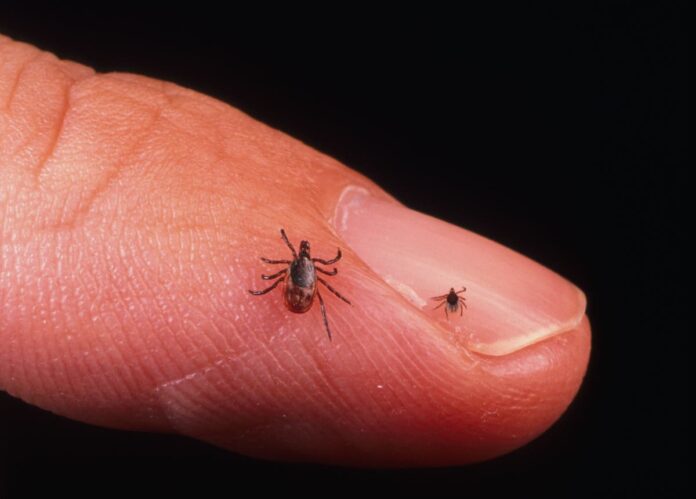A British dog walker has been left unable to leave his house after tick bites left him with a potentially fatal allergy to red meat. Christopher Goldman, 28, caught alpha-gal syndrome after being bitten by a tick in December. He was walking in woodland near his home in Woking, Surrey at the time and has since been bitten at least four times. Speaking to Sky News, Goldman explains that he now exclusively wears vegan-approved clothing and uses guaranteed animal-free products. Anything he previously had in his home that contains animal products has been quarantined to a room at the front of his house which he no longer visits. Female lone-star tick, known to spread AGS in the US On 28 June, he had his most serious episode when he suffered a life-threatening allergic reaction to red meat he had eaten a few hours before. He said:’I woke up with intense itching and I was very hot,’ he explained, ‘my skin was crimson red and I had hives all over my body.’ Here’s everything you need to know about the tick-bourne disease: What is alpha-gal syndrome (AGS)? AGS is a serious, potentially fatal allergic condition. It is an allergy to the alpha-gal sugar molecule, which is found in most mammals. Alpha-gal can be found in meat (pork, beef, rabbit, lamb, venison, etc.) and products made from mammals (including gelatin, cow’s milk, and milk products). It is not found in fish, reptiles, birds, or people. AGS symptoms will generally occur after people eat red meat or are exposed to any product containing alpha-gal. Can I get alpha-gal syndrome from a tick bite? Yes. Although there is little research into alpha-gal syndrome, especially in the UK, evidence suggests it can be linked to tick bites. A small number of ticks can be infected with bacteria or viruses, and through biting humans can pass these on. Lyme disease is the most common disease spread this way, with up to 4,000 cases in England and Wales every year. Speaking to Sky News, Professor Richard Wall from the University of Bristol explains how alpha-gal syndrome can be caught from tick bites: ‘The ticks have got this alpha-gal sugar in their saliva, when they feed they inject that into your blood stream, you then mount an immune response to that sugar. You have antibodies against it.’ How high is the risk? While the risk of catching alpha-gal syndrome in the UK is low, cases of Lyme disease have shown to be steadily on the rise, possibly due to an increase in bites. From 2013 to 2020, recorded cases rose by nearly 35 per cent. Professor Wall said climate change may be linked to an increase in tick bites: ‘With the changing climate we’re seeing them certainly biting all winter and we’re seeing a gradual change in seasonal patterns. So, the risk of biting is now fairly common all season round.’ However, only around 1-5 per cent of tick bites lead to Lyme disease and cases of tick-borne encephalitis – that can cause alpha-gal syndrome – remain even less common than this. To minimise the risk of tick bites, the UK health security agency recommends wearing clothing that covers your skin while walking in wooded areas. They also suggest using insect repellent and ensuring you check your pets for ticks. What are the symptoms of AGS? The US CDC outlines the main symptoms of AGS as: – Hives or itchy rash – Nausea or vomiting – Heartburn or indigestion – Diarrhea – Cough, shortness of breath, or difficulty breathing – Drop in blood pressure – Swelling of the lips, throat, tongue, or eye lids – Dizziness or faintness – Severe stomach pain If you are worried you are suffering with AGS or any tick-bourne illness, you should contact NHS 111.


